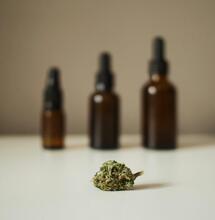Cannabis, PTSD and Ukraine

Ukrainian President Volodymyr Zelensky recently signed new law reforms on medical Cannabis to deliver relief to victims of trauma, as a result of the ongoing war with Russia. The new law permits the use of medical Cannabis for patients struggling with serious health conditions, including PTSD.
The Ukrainian Ministry of Health gauges that more than six million people are living with PTSD and other issues related to mental health-related issues, with a large number also living with chronic pain.
What is PTSD?
PTSD affects approximately one in three people. symptoms include severe anxiety, flashbacks, and nightmares. It is a particular burden for those who have experienced military combat, with a high number of cases being seen in war veterans. Antidepressants seem to often fall short in terms of efficacy and can be associated with negative effects. As a result, medical Cannabis has attracted attention as an alternative treatment for PTSD. It promises fewer side effects and possible improvements in managing symptoms.
What Does the Evidence Say?
PTSD is a good example of a disorder that is relieved by Cannabis treatment, but the evidence remains limited and as with most Cannabis research, there is a desperate need for more thorough studies. So far there has only been one controlled clinical study however several observational experiments and laboratory tests have shown promise for Cannabis as a treatment of PTSD.
A 2021 metareview assessed 11 other studies where medical Cannabis had been used to treat PTSD. Many of the participants reported reductions in symptoms and improvements their quality of life.
A cross-sectional study published last year surveyed 510 U.S. veterans about their Cannabis use for conditions including chronic pain, PTSD, and associated issues like anxiety and depression.
In this study, 91% of Cannabis users noted an enhancement in their quality of life, and 21% were able to reduce their dependency on opioid painkillers. This was a self-reported survey which also highlighted Cannabis as a better alternative to other available treatment options.
In a separate study involving 150 participants tracked over the course of 12 months, substantial decreases in PTSD symptom severity were witnessed with Cannabis use.
Significantly, participants who acquired Cannabis from dispensaries had more than double the chance of no longer meeting PTSD benchmarks by the end of the study. This suggests a possible use of Cannabis in trauma recovery past initial symptom management. Furthermore, the study emphasises that the success of PTSD treatment may rely on the type of Cannabis used as well as the source.
Laboratory research verifies clinical findings by showing the role of the endocannabinoid system in PTSD. Evidence shows that PTSD is connected to increased availability of cannabinoid type 1 (CB1) receptors. Further still THC has been noticed to reduce activity in the amygdala, the brain region that controls fear responses. These understandings strengthen the theory that THC may regulate threat-related processing in those with PTSD, delivering a possible pharmacological path for the treatment of trauma and stress-related disorders.
The usefulness of any new program is completely reliant on the exhaustive education of medical professionals and the integration of research programs.
The Ukrainian Association of Medical Cannabis and The Ukrainian Medical Cannabis Association were created to mould the industry and push educational and research endeavours forward
. Ukrainian-born Cannabis expert Hanna Hlushchenko has played a pivotal role in contributing to the drafting of the new laws and is directing educational endeavours. Hlushchenko has additionally facilitated a collaboration between Ukrainian Health Minister Viktor Liashko and German counterpart Karl Lauterbach by visiting German medical Cannabis companies to gain support and acquire valuable understandings from a prosperous and established medical program.
The development of comparable initiatives could bring success to Ukraine’s program. These initiatives can also add to a more widespread understanding of the impact of medical cannabis, especially when it comes to veterans who often lack access to and financial support for medicinal cannabis despite the prospect of it enhancing their quality of life.
The new legislation has created an exceptional chance to offer potentially life-changing treatments for the treatment of extreme war-related conditions on an expansive scale and during the ongoing war.
Continuing such a proactive approach will make it appealing for developed markets to partake, not only in contributing products but also in delivering critical support for education and research programs. Such efforts may strengthen the development and evolution of a powerful program, boost critical aid to a country in despair, and showcase to the rest of the world the conceivable impact that medical Cannabis could have in healing the traumatic damage of war.
More From Soft Secrets
War in Europe and the Legal Industry
Things to Know Before Taking Medical Cannabis
Medical Cannabis Pros and Cons








